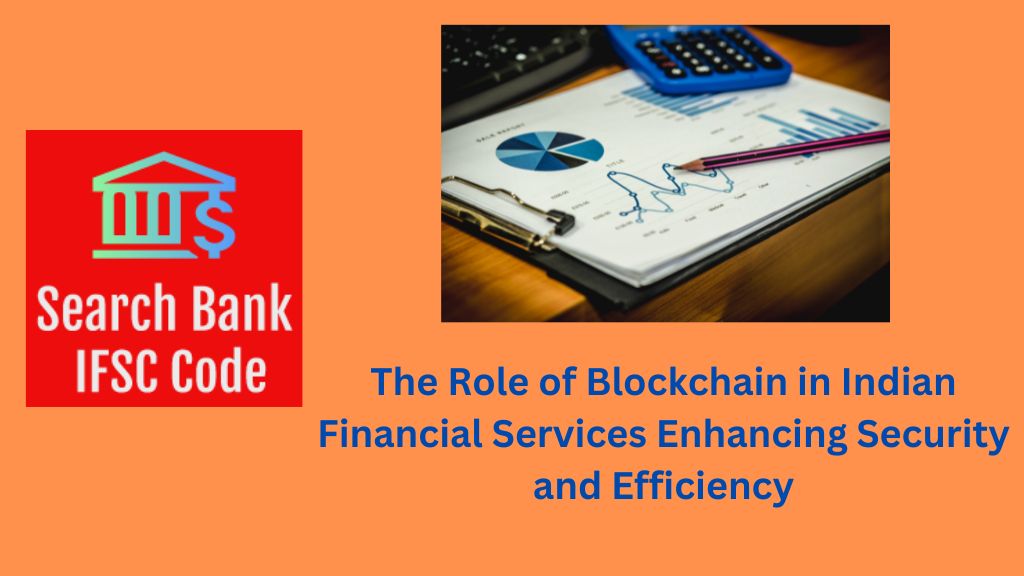The Role of Blockchain in Indian Financial Services: Enhancing Security and Efficiency
Created at: 2023-07-06
Introduction
The advent of blockchain technology has transformed various industries, and the Indian financial services sector is no exception. Blockchain offers the potential to revolutionize traditional financial systems by enhancing security, transparency, and efficiency. In this blog, we will explore the role of blockchain in Indian financial services and delve into its impact on key aspects such as banking, payments, and data security. We will examine how blockchain's decentralized and transparent nature can improve trust and enable secure transactions. Join us as we unravel the potential of blockchain to reshape the Indian financial landscape and create a more secure, efficient, and inclusive financial ecosystem.

Section 1: Understanding Blockchain Technology
1.1 What is Blockchain?
Blockchain is a decentralized, immutable, and transparent digital ledger that records transactions across multiple computers or nodes. It uses cryptographic algorithms to ensure the integrity and security of data. Each transaction, or "block," is added to a chain of previous transactions, creating a chronological and tamper-proof record.
1.2 Key Features of Blockchain
Blockchain is characterized by several key features that differentiate it from traditional centralized systems. Firstly, decentralization means that there is no single central authority controlling the blockchain, making it more resistant to manipulation or hacking. Immutability refers to the inability to alter or delete previously recorded transactions, ensuring the integrity and auditability of the data. Transparency allows all participants to view the transactions on the blockchain, promoting trust and accountability.
Another crucial feature of blockchain is security. The use of cryptographic algorithms ensures that transactions are securely recorded and that sensitive data remains confidential. Additionally, blockchain can enhance efficiency by streamlining processes, automating tasks through smart contracts, and reducing the need for intermediaries.
These key features make blockchain an ideal technology for financial applications, offering the potential to create a more secure, transparent, and efficient financial infrastructure. In the following sections, we will explore the specific applications and implications of blockchain in Indian financial services.
Section 2: Blockchain in Indian Financial Services
2.1 Secure and Efficient Payments
Blockchain-based payment systems offer faster, more secure, and cost-effective transactions. They eliminate the need for intermediaries, reduce settlement times, and enhance cross-border transactions. The adoption of blockchain in India's payment systems can streamline processes, reduce fraud, and improve financial inclusion. Blockchain enables peer-to-peer transactions that are recorded and verified on the decentralized ledger, ensuring transparency and security. With blockchain, individuals and businesses can send and receive payments directly, eliminating the need for intermediaries such as banks or payment processors. This can result in faster transaction settlement times, lower transaction fees, and increased accessibility to financial services for the unbanked and underbanked populations.
2.2 Smart Contracts and Automation
Blockchain enables the implementation of smart contracts, which are self-executing agreements with predefined conditions. Smart contracts automate and enforce contractual obligations, reducing the need for intermediaries and minimizing transactional errors. This technology can enhance efficiency, reduce costs, and enable secure digital transactions. In the Indian financial services sector, smart contracts can be utilized for a wide range of applications, such as trade finance, insurance claims settlement, and supply chain management. By automating processes and removing the need for manual intervention, smart contracts can improve efficiency, eliminate disputes, and ensure transparent and auditable transactions.
2.3 KYC and Identity Verification
Blockchain can revolutionize Know Your Customer (KYC) processes and identity verification by providing a decentralized, tamper-proof repository of customer information. Currently, KYC processes involve duplicative efforts as customers provide their information to multiple financial institutions. With blockchain, customers can have control over their personal data and grant permission to access it to specific institutions as needed. This can streamline customer onboarding, reduce paperwork, and enhance data security and privacy. Blockchain's immutable nature ensures that once customer information is recorded, it cannot be altered or manipulated, providing a higher level of trust and security in identity verification processes.
Section 3: Challenges and Adoption Barriers
3.1 Regulatory Framework and Compliance
The regulatory landscape plays a crucial role in the adoption of blockchain technology in Indian financial services. Establishing clear guidelines, addressing legal concerns, and ensuring compliance are essential for widespread blockchain adoption. Regulators need to strike a balance between promoting innovation and safeguarding consumer protection, privacy, and security. The Reserve Bank of India (RBI) and other regulatory bodies need to provide a supportive regulatory framework that encourages the responsible use of blockchain technology while addressing potential risks and concerns.
3.2 Interoperability and Scalability
Blockchain networks need to be interoperable to enable seamless integration with existing financial systems. Interoperability allows different blockchains to communicate and share data, facilitating interoperable transactions and data exchange. Achieving interoperability is crucial for the widespread adoption of blockchain in the Indian financial services sector. Additionally, scalability is a challenge that needs to be addressed. As the number of transactions on the blockchain increases, scalability becomes critical to ensure that the network can handle the volume of transactions without compromising efficiency and security. Advancements in blockchain technology, such as layer-2 solutions and sharding, are being explored to address scalability challenges.
3.3 Data Privacy and Security
While blockchain offers enhanced security through its cryptographic algorithms and decentralized nature, ensuring data privacy and security remains a challenge. Confidentiality of sensitive information, such as financial transactions and personal data, needs to be protected through appropriate encryption techniques and privacy protocols. Additionally, securing the blockchain infrastructure and preventing unauthorized access or malicious attacks are essential for maintaining the integrity and trust of the system. Continuous research and development in blockchain security measures and the adoption of best practices are necessary to address these challenges and ensure the widespread adoption of blockchain in Indian financial services.
In conclusion, blockchain technology has the potential to transform Indian financial services by enhancing security, efficiency, and transparency. The adoption of blockchain-based payment systems, smart contracts, and improved KYC processes can revolutionize the way financial transactions are conducted and improve access to financial services for all segments of the population. However, addressing challenges related to regulatory frameworks, interoperability, scalability, and data privacy and security is crucial for the successful implementation of blockchain in the Indian financial landscape. With collaborative efforts between regulators, industry participants, and technology providers, blockchain can pave the way for a more secure, efficient, and inclusive financial ecosystem in India.
Section 4: Future Outlook and Opportunities
4.1 Blockchain-Based Digital Identity
Blockchain can provide individuals with self-sovereign digital identities, empowering them to control their personal information securely. This can enable frictionless, trusted interactions across various sectors, including finance, healthcare, and government services. Blockchain-based digital identity solutions can streamline customer onboarding processes, enhance data privacy and security, and eliminate the need for repetitive identity verification across different institutions. Individuals can have control over their identity information, granting permission to access specific data as required, while ensuring the integrity and immutability of their personal records. This can pave the way for a more seamless, secure, and user-centric digital ecosystem.
4.2 Trade Finance and Supply Chain Management
Blockchain technology can streamline trade finance processes, automate documentation, and enhance transparency and traceability in supply chains. By leveraging blockchain's decentralized ledger, all stakeholders in the trade ecosystem can have real-time visibility into the movement of goods, verification of ownership, and validation of documents. This can mitigate fraud, reduce paperwork, and improve efficiency in cross-border trade. Smart contracts can automate trade agreements, enabling seamless execution and settlement based on predefined conditions. Blockchain-based supply chain solutions can provide a single source of truth for all participants, ensuring transparency, reducing disputes, and enabling faster and more secure trade finance operations.
Conclusion
In conclusion, blockchain technology holds immense potential to revolutionize Indian financial services by enhancing security, transparency, and efficiency. From secure and efficient payments to smart contracts, KYC processes, and identity verification, blockchain can address critical challenges and transform the financial landscape. However, to fully leverage the benefits of blockchain, it is crucial to address regulatory concerns, promote interoperability, ensure scalability, and prioritize data privacy and security. With the right frameworks, collaborative efforts, and continued innovation, blockchain can unlock new opportunities, foster financial inclusion, and create a more secure and inclusive financial ecosystem in India.
As the adoption of blockchain accelerates and stakeholders embrace its potential, the future of Indian financial services looks promising, marked by increased efficiency, improved trust, and enhanced access to financial services for all. For individuals seeking specific banking services, platforms like SearchBankIFSCCode.com offer valuable resources. Websites such as ICICI Bank's page on SearchBankIFSCCode.com provide comprehensive information about bank branches, IFSC codes, and other details, facilitating smooth and convenient banking transactions.





